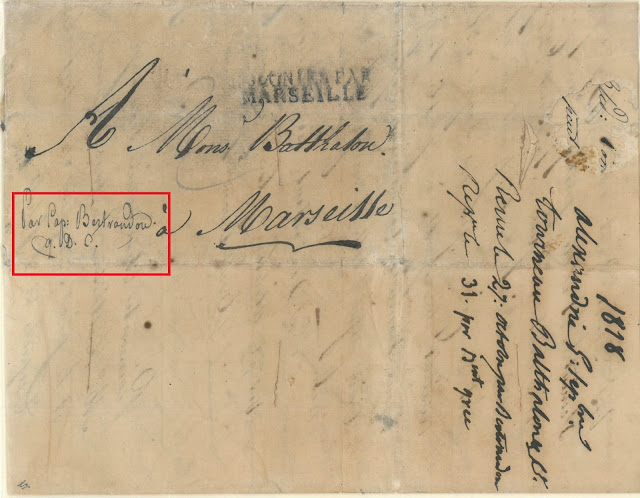Some of us who collect prephilately, whether it is our main topic or just because it fills our thematic collection, have often noticed some letters or abbreviations on mail, often on maritime mail. It is bad enough trying to decipher the address itself but then you get letters that you scratch your head wondering what they are.
What is of interest to us today are the letters Q.D.C. Now before I continue let me explain what this is. From approximately the end of the 17th century until the beginning of the 19th century, maritime mail used marks such as Q.D.C. or Que Dieu Conduise which means "May God Guide". This, added together with the name of the ship and the captain showed that the fee for the mail was paid for although it was quite often free. They were then distributed locally free of charge in the port. It seemed to be acceptable practice that the marks + the name of the ship + the name of the captain meant that postage had been paid, either free or not, so no further fee was charged. This is as seen on French maritime mail as the item above.
According to one source similar markings exist on maritime mail from other countries such as "Which God Protect" (WGP) (English), "Che Dio Guardia" (Italian), or "Que Deus Guia" (Portuguese). I must admit that I have never seen any of these.
One other marking is seen, but not as often, DLC or "Dieux Le Conduit” which basically means “God leads”.
Getting back to the item shown above. It was sent in 1818 from Alexandria to Marseille and is endorsed 'par Cap. Bertrand ou Q.D.C.' with chisel slits for disinfection. From 1787, ships from suspect areas bound for France were sent to a quarantine office at the foot of Fort St. Jean, in Marseille harbour, where they were slit for fumigation and dipped in vinegar.
The letter was addressed to a Mr. Balthalon and there is a bit of a story here. Pierre Balthalon mainly, but also others in his family, such as his brother, were the receiving point in Marseille for Bernardino Drovetti, the French council in Alexandria, to trade antiquities. Mr. Drovetti used others as receiving points as well, although to a lesser extent, and Balthalon had other connections to trade in Alexandria (the trading house there existed before and after Drovetti, established by Pierre's father and survived until their bankruptcy later in the 19th century.
For more information see:
.









thanks! very interesting, I wonder if it also possible to use בס"ד (:
ReplyDelete